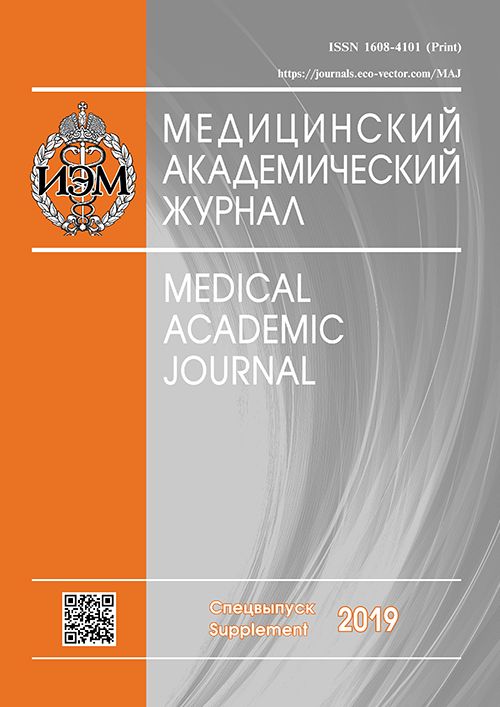THE LEVEL OF SYSTEMIC INFLAMMATION AND CHANGES IN ADAPTIVE IMMUNITY IN ALCOHOLIC PSYCHOSES
- Authors: Didkovsky NA1, Malashenkova IK1,2, Ogurtsov DP1,2, Krynskiy SA2, Hailov NA2, Chekulaeva EI2, Mamoshina MV2, Ushakov VL2, Zakharova NV3, Kostyuk GP3
-
Affiliations:
- FSBI FCRC of Physical-Chemical Medicine FMBA of Russia, Moscow
- NRC “Kurchatov Institute”, Moscow
- Psychiatric Clinical Hospital No. 1 named after N.A. Alekseev, Moscow
- Issue: Vol 19, No 1S (2019)
- Pages: 68-70
- Section: Articles
- Published: 15.12.2019
- URL: https://journals.eco-vector.com/MAJ/article/view/19329
- ID: 19329
Cite item
Abstract
Full Text
About the authors
N A Didkovsky
FSBI FCRC of Physical-Chemical Medicine FMBA of Russia, Moscow
I K Malashenkova
FSBI FCRC of Physical-Chemical Medicine FMBA of Russia, Moscow; NRC “Kurchatov Institute”, Moscow
D P Ogurtsov
FSBI FCRC of Physical-Chemical Medicine FMBA of Russia, Moscow; NRC “Kurchatov Institute”, Moscow
S A Krynskiy
NRC “Kurchatov Institute”, Moscow
N A Hailov
NRC “Kurchatov Institute”, Moscow
E I Chekulaeva
NRC “Kurchatov Institute”, Moscow
M V Mamoshina
NRC “Kurchatov Institute”, Moscow
V L Ushakov
NRC “Kurchatov Institute”, Moscow
N V Zakharova
Psychiatric Clinical Hospital No. 1 named after N.A. Alekseev, Moscow
G P Kostyuk
Psychiatric Clinical Hospital No. 1 named after N.A. Alekseev, Moscow
References
- Williamson LL, Bilbo SD. Chemokines and the hippocampus: A new perspective on hippocampal plasticity and vulnerability. Brain, Behavior, and Immunity. 2013;30:186-194. https://doi.org/10.1016/j.bbi.2013.01.077.
- Malashenkova IK, Krynskiy SA, Khailov NA, et al. The Role of Cytokines in Memory Consolidation. Biology Bulletin Reviews. 2016;6:126-140.
- Alfonso-Loeches S, Pascual-Lucas M, Blanco AM, et al. Pivotal role of TLR4 receptors in alcohol-induced neuroinflammation and brain damage. The Journal of Neuroscience. 2010;30(24):8285-8295.
- Robinson G, Most D, Ferguson LB, et al. Neuroimmune Pathways in Alcohol Consumption: Evidence from Behavioral and Genetic Studies in Rodents and Humans. Int Rev Neurobiol. 2014;118:13-39.
- Kelley KW, Dantzer R. Alcoholism and Inflammation: Neuroimmunology of Behavioral and Mood ¬Disorders. Brain Behav Immun. 2011;25:13-20.
Supplementary files







